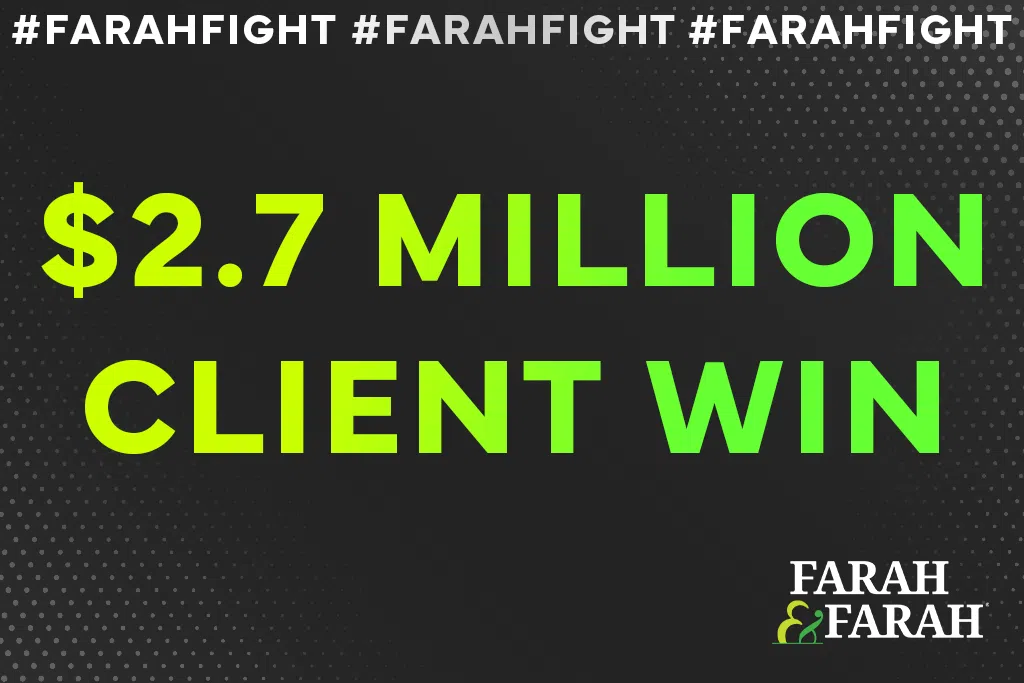Florida Wrongful Death Lawyers
If you’ve lost a loved one, you may feel helpless, confused and frustrated. The pain of the tragedy is immense. What makes it worse is that someone else’s negligence, carelessness, or reckless behavior contributed to the fatal circumstance.
Home » Florida Personal Injury Lawyers » Wrongful Death Attorneys
A wrongful death lawsuit can’t relieve emotional pain or bring your loved one back. However, it can provide help ease the financial burden caused by your loss, seeking compensation funeral expenses, medical bills, lost earnings, lost inheritance, and other financial hardships.
At Farah & Farah, our Florida personal injury lawyers know that pursuing a lawsuit isn’t the easiest thing to do. But in many cases, it’s the right thing to do. When you’ve lost a loved one in an incident where someone else is at fault, a wrongful death lawsuit may help secure the financial support you deserve. Call us today at (877) 245-6707 for a free consultation because we want to help.
How Farah & Farah Can Help
When you trust us with your wrongful death lawsuit, we will always offer you the emotional support you need when trying to cope with such a loss. Know that you will be treated as a person first, not a client. Here are some ways we can help:
- Investigate the incident and determine who is at fault
- Negotiate any medical bills to reduce your overall financial burden
- Collect relevant evidence and start building a case
- Sift through all the required paperwork from insurance companies
- Pay all outstanding hospital bills that resulted from the accident
What Constitutes a Wrongful Death in Florida?
Typically, heirs, beneficiaries or survivors of the deceased are eligible to file a wrongful death claim. Though there are limitations, an attorney can provide clarification on who is eligible to file a wrongful death claim. Wrongful death is substantiated by the following:
- It must be proven that the person who caused wrongful death, known as the defendant, had a duty to act responsibly but failed.
- The defendant denounced their duty and failed to fulfill their rightful obligations.
- Wrongful death or injuries were sustained to the victim due to the recklessness of the defendant and their failure to adhere to a specific responsibility.
Who Can File a Wrongful Death Lawsuit in Florida?
A wrongful death lawsuit may be brought in court to hold negligent parties accountable when their actions lead to the death of another person. Family members who may recover damages in a Florida wrongful death case include the person’s spouse, children or parents, and any blood relative or adoptive sibling who is dependent on the decedent for support.
What Damages Can Be Recovered in Florida?
Once liability has been determined for the wrongful death of your loved one in Florida, damages may be recovered to help ease the financial burden and help you get on with your life. Some of the damages you may be entitled to include:
- Medical costs incurred as a result of the accident, prior to their death
- The cost of the funeral and burial
- Lost wages and future lost wages
- Loss of inheritance
- Pain and suffering experienced by your loved one prior to death
- Loss of companionship
- Loss of care or guidance that would have been provided by your loved one
Statute of Limitations on Wrongful Death Suits in Florida
In the event of wrongful death in the state of Florida, you have a time limit from the date of death to file a wrongful death suit. Filing a suit in these situations can be very trying because you’re still grieving and it can all seem really overwhelming.
The wrongful death lawyers at Farah & Farah understand the turmoil you are going through and we want to help. You shouldn’t have to shoulder the financial burden on top of the loss you have suffered.
What You Can Expect When You Hire Our Wrongful Death Attorneys
Hiring an attorney is a major decision and you need one who can handle your wrongful death claim with compassion. At Farah & Farah, our attorneys have handled wrongful death claims in Florida and we can put that experience to work for your claim.
- Your legal team will get to know you and your family to learn how the wrongful death has affected your lives.
- You can expect compassion, respect, and dignity throughout the entirety of your case. Your attorneys will provide ongoing updates as they arise.
- Farah & Farah will launch a comprehensive investigation into your wrongful death claim and determine the liable party or parties and the damages available to you and your family.
- You pay no upfront fees. You and your family have enough to worry about during this challenging time, paying for a wrongful death lawyer shouldn’t be one of them.
We want to help Florida families recover after experiencing the untimely deaths of their loved ones. When negligent actions lead to a person’s death, the surviving loved ones can hold the responsible party accountable through a wrongful death claim.
Our Recent Wrongful Death Wins
- $2,700,000: A man was on his fishing boat when his boat flipped and sucked into a dam due to spill gates being opened without warning.
- $1,300,000: A truck driver was struck by semi while at a loading dock, resulting in death.
- $1,200,000: Wrongful death of a young father of three children.
- $950,000: A careless driver ran a husband and wife off the road. The husband did not survive the accident.
Why Hiring an Attorney Is Important
A wrongful death claim may appear simple; the defendant was negligent in some way that contributed to or directly caused the death of your loved one. However, things are rarely this simple in a wrongful death claim and countless possible factors could complicate your case. Hiring an attorney means you can grieve in peace knowing your legal affairs are in capable hands.
Wrongful Death FAQs
What is wrongful death?
Wrongful death is defined as the death of a person that is caused directly by the conduct of another person, either through a negligent act, or a failure to act. This is distinguishable from a charge of murder in one essential way: wrongful death suits are civil, whereas murder cases are criminal.
What are some common causes of wrongful death?
Wrongful death cases may arise out of a motor vehicle accident, including DUI, a workplace accident, an auto product liability claim or medical malpractice. Each of these case types are different, with different documentation and evidence required, but the thread that runs through them is always the same: if the death was caused by another person, monetary damages may be assigned to family members as a result.
What is the difference between wrongful death and murder?
A murder charge is filed in criminal court, while a wrongful death lawsuit is handled in civil courts. In a criminal case, a defendant found guilty is punished for the crime with jail time. In a civil case, the defendant is found “liable” and is held financially responsible for the victim’s death. In a criminal murder case, the burden of proving guilt is on the prosecution. In a wrongful death case, the burden of proving liability is on the plaintiff. Also, in murder cases, juries look at the defendant’s intent in terms of committing the crime. In wrongful death cases, jurors determine whether the defendant was negligent and caused the decedent’s fatal injuries.
What are the main elements of a wrongful death case?
To be successful with a wrongful death claim, plaintiffs must prove that:
- Their loved one’s death was caused by the defendant or that the defendant’s actions or lack of action contributed to the death.
- The death occurred as a direct result of the defendant’s negligence or wrongdoing.
- The decedent’s death affected family members, survivors or dependents financially.
- The loved one’s death resulted in expenses or monetary damages.
How are damages determined in a wrongful death case?
In a Florida personal injury case, damages are awarded based on the impact the injury may have on the affected party. But, damages in a wrongful death compensate the surviving family members for the impact the loss of the decedent has on their emotional and financial well-being. In a wrongful death case, plaintiffs will most often be awarded compensatory damages that may cover the cost of medical care, funeral and burial expenses, and other costs the family may have incurred because of their loved one’s death.
As part of compensatory damages, courts may award plaintiffs income the decedent may have earned if they lived. In such cases, lost income will be calculated based on the age of the victim at the time of death, the victim’s average life expectancy, and earning potential. Compensatory damages can also be awarded for the value of the decedent’s contribution to the household such as housekeeping or childcare services. Non-economic damages such as grief and emotional distress may also be included here. Besides compensatory damages, the court may also decide to award punitive damages to family members, particularly if the defendant’s reckless or egregiously negligent acts resulted in the untimely death of the decedent. Punitive damages are imposed in addition to compensatory damages.
How much does a Florida wrongful death attorney charge?
The attorneys at Farah & Farah want to make legal counsel accessible and affordable for everyone, regardless of their ability to pay. We take every case with a contingency fee agreement, meaning we do not collect legal fees unless we win your case. If we do, our fees come out of a portion of your settlement or jury award. You will never see a direct bill for our legal services, nor will you see any up-front fees for any of our legal services.
Let Farah & Farah Handle Your Florida Wrongful Death Claim
Florida state law dictates who is eligible to file a wrongful death claim, the damages available from a successful claim, and the damages available to both the deceased’s estate and the surviving family members. Your loved one’s untimely death may not have only resulted in expensive medical bills and lost income between the injury and his or her death, but also significant pain and suffering for everyone involved.
Wrongful death claims are some of the most complex civil cases and the last thing you want to worry about while mourning the death of a loved one is a legal battle. When you work with Farah & Farah, we can handle the legal issues surrounding your wrongful death claim so you and your family can grieve in peace with the confidence of knowing your claim is in experienced and capable hands.

What Constitutes a Wrongful Death in Florida?
Who Can File a Wrongful Death Lawsuit in Florida?
What Damages Can Be Recovered in Florida?
Statute of Limitations on Wrongful Death Suits in Florida
What You Can Expect When You Hire Our Wrongful Death Attorneys
Our Recent Wrongful Death Wins
Why Hiring an Attorney Is Important
free case review
Client Testimonials


YOU AND YOUR FAMILY

Related Blogs








